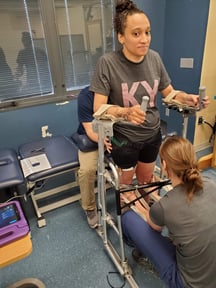Hope Happens Here: Marissa Kirkling
Join Our Movement
What started as an idea has become a national movement. With your support, we can influence policy and inspire lasting change.
Become an Advocate
Training the Body to Relearn
The blood pressure issue is more than bothersome; a sudden precipitous rise or fall in blood pressure can be life-threatening. For Marissa, having low blood pressure stifled her activities and degraded her quality of life. “I would try to get up for the day and just pass out. Or it could happen at the store. When you feel sick all the time, you can’t really plan for much. I didn’t want to go to school. I didn’t want to go out because I was afraid something would happen.”
Training with the stimulator enabled Marissa to self-regulate her blood pressure even when the stimulator is off. “By doing that training consistently, my body has learned that this is where my blood pressure is supposed to be. Now that I have trained for so long with the stimulator, I don’t have those episodes anymore. I’m back in school, I go out all the time. I’m in a relationship. It’s literally been a life-changer, just the cardiovascular portion alone.”
“It’s literally been a life-changer, just the cardiovascular portion alone.”
Hard Work, Dedication and Support
It didn’t come easy though. It took two years of intensive training to achieve blood pressure regulation without the stimulation. Standing and regaining voluntary movement are even greater hurdles.
“A lot of people think that you just get this stimulator implanted and you start to move around. That’s not the case at all,” Marissa says. “You really have to try to connect with your body again. You might start by working just the toe, say for an hour a day, then the foot, then eventually the whole leg. It takes practice -- a lot of practice, along with dedication and hard work.”
Community helps also. The rehab team at Frazier became like a big extended family during her two years there, and she and other study participants stay connected through peer support and outreach. Marissa volunteers her time to answer any questions people may have who are considering enrolling.
“The work they’re doing with this whole project is amazing,” she says. “I wish everybody who is quadriplegic or paraplegic could get this stimulator, because it’s just been a life-changer.”
To help support The Big Idea, please visit christopherreeve.org/donate.
Written by Brenda E. Patoine
 Marissa has a C4 complete spinal cord injury following a car accident in 2015 that left her quadriplegic. She was 24 at the time, pursuing a nursing degree in Arizona, far away from her hometown of Greensburg, Penn. Everything changed on that day. Her doctor told her mother she would be nothing but a “talking head” for the rest of her life, and advised her to put Marissa in a nursing home. Her mom refused, taking her instead to
Marissa has a C4 complete spinal cord injury following a car accident in 2015 that left her quadriplegic. She was 24 at the time, pursuing a nursing degree in Arizona, far away from her hometown of Greensburg, Penn. Everything changed on that day. Her doctor told her mother she would be nothing but a “talking head” for the rest of her life, and advised her to put Marissa in a nursing home. Her mom refused, taking her instead to